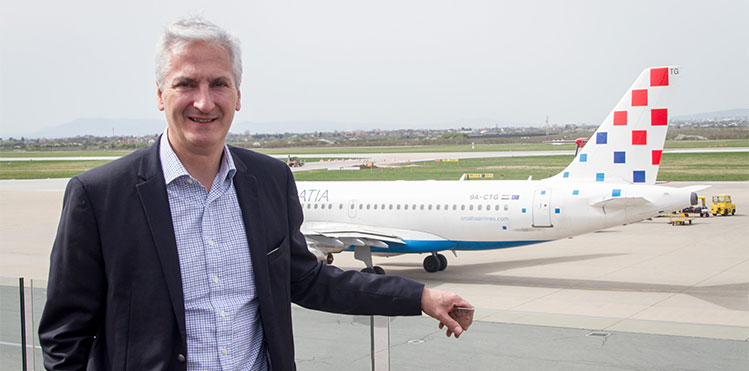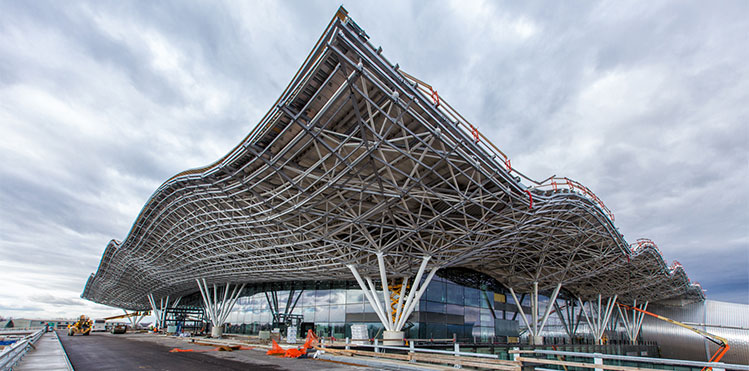
Jacques Feron, CEO Zagreb Airport: “I have extensive experience in managing projects and companies in transport infrastructure, such as airports, roads and tunnels. All these projects were under public-private partnership.”
Jacques Feron, CEO Zagreb Airport, interviewed by Ross Falconer.
At first glance, the future of Zagreb Airport appears promising. The traffic figures (+7% to 2.6 million passengers in 2015) illustrate that it is benefiting from the economic and touristic development of Croatia’s capital city, and a new €250 mil-lion terminal opens in Q1 2017. So what do these developments mean for the future ambitions of the airport, and indeed the country?
Jacques Feron became the new CEO of Zagreb Airport in October 2015, bringing considerable experience in international projects, construction, financing and developing transport infrastructure. He was previously the CEO of Cambodian Airports – the concessionaire company in charge of Phnom Penh, Siem Reap and Sihanoukville airports – and earlier in his career participated in the international development activities of Aéroports de Paris, notably in Central America and the Middle East.
Feron’s first six months with Zagreb have inevitably focused largely on the new terminal project, which is being developed and managed under a 30-year concession agreement through a consortium led by Aéroports de Paris Management and Bouygues Bâtiment International.
“Airports are crucial for the development of the economy – infrastructure and services have to be at the highest inter-national level,” he emphasises. “With a very impressive design, the new terminal building will definitively be a fantastic tool for the promotion of Zagreb. Our ambition is to make Zagreb Airport a reference point in terms of well-managed and developed infrastructure.”
The project comprises a total invest-ment of approximately €350 million, including €250 million for the design and construction of the new terminal. It is being financed by equity from share-holders (Aéroports de Paris, Bouygues, TAV, Viadukt) and financial investors (Margueritte and IFC), as well as loans from commercial banks and financial institutions.
Feron’s previous experience, especially of working under a concession scheme, is certainly informing the developments. “In terms of management, each of my past experiences helps a lot with new challenges, but the common characteristic that is driving my actions at Zagreb Airport is the proper balance between the quality of service to be delivered at the right cost, and the fair return to private investors,” he says. “As management, we have many clients – passengers, airlines, public authorities, shareholders and employees. Each of them are expecting the very best from you, and being a performing concessionaire, we have to find the proper balance to deliver each of their expectations.”
Efficient and flexible: Positioning Zagreb as a European hub
The new terminal is the largest construction site in Croatia. Now in the third year of construction works, the roof and façade are complete, and the testing and commissioning phase is about to start. Feron reports that interior works are progressing well, with work on the commercial areas to begin in a few months.
Once complete, the new terminal will be capable of handling five million passengers annually, compared with the current capacity of two million. Further extensions envisaged along the 30-year concession period will potentially see capacity increased to eight million. With continuing growth, this will certainly be welcome. Indeed, building on the record result of last year, passenger traffic rose by 6% year-on-year in the first two months of 2016.
Its geographical location in Central Europe, of course, means that Zagreb competes with several airports – Ljubljana, Maribor, and Trieste among them. Central to Zagreb’s expansion, therefore, is the goal to better position it as a European hub. “An airport such as Zagreb cannot decide to become a hub on its own,” Feron explains. “It is airlines which make an airport a hub. At our concessionaire level, we shall accompany the airlines, and especially Croatia Airlines, in their strategies by being efficient and flexible.”
This flexibility is twinned with a proactive approach to attracting new routes. The airport supports any new route with a five-year scheme to reduce airline start-up costs. Based on the individual merits of the proposed route growth, the airport may look to offer additional backing through marketing support. Indeed, Zagreb’s diverse marketing initiatives include using its consumer magazine, email database, and website banners to promote any new service.
Throughout our briefing, Feron speaks confidently about the future of Zagreb Airport. Indeed, all the elements of an effective strategy are in place, with the new terminal providing capacity to meet current growth trends, and a creative approach to new route development. Zagreb Airport is in an exciting and ambitious phase. “This project is very challenging, but it is already a success in that the construction is ahead of schedule. We are very confident that with this new tool we will definitively be able to improve the quality of services provided to all of our business partners,” Feron concludes.

Zagreb Airport is recognised at Level 2 Reduction of ACI’s Airport Carbon Accreditation, and its new terminal is described as a “distinctive, environmentally advanced building.” Initiatives include fuel-efficient vehicles, innovative wastewater technology, thermal modelling, and natural gas-supplied high efficiency boilers.







